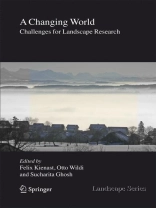Landscape Research has been established as an interdisciplinary field dealing with complex environmental processes at multiple spatial and temporal scales. During the course of its history, various societal, technological and philosophical stimuli have shaped Landscape Research, e.g. the declaration of Landscape Ecology in the 1930s and contemporary global technological and societal developments.
Modern landscape research presently uses mathematics, statistics and advanced simulation techniques to combine empirical observations with known theories from ecology, physics, geography, social science and so on. Knowledge is thus updated and quantified via models that are used for estimation, hypothesis testing, prediction and assessment of scenarios. Advances in the computational sciences (e.g. fast computers and vast array of software), space science (e.g. remote sensing) and biological sciences (e.g. genetics) as well as new perspectives in the social sciences play important roles. Research findings are implemented in conservation management, urban planning and global change mitigation strategies.
This book identifies emerging fields and new challenges that are discussed within the framework of the ‘driving forces’ of Landscape Development. Rather than offering a comprehensive overview of all fields of Landscape Research, the book addresses ‘hot topics’ emphasizing major contemporary trends in these fields.
Inhaltsverzeichnis
Change and Transformation: A Synthesis.- Change and Transformation: A Synthesis.- Value Systems – Major Drivers of Landscape Dynamics.- Value Systems: Drivers of Human-landscape Interactions.- The Role of Value Systems in Biodiversity Research.- The Meaning of “Landscape” – An Exegesis of Swiss Government Texts.- Space and Place – Two Aspects of the Human-landscape Relationship.- Ecological Observations and Processes.- Modern Remote Sensing for Environmental Monitoring of Landscape States and Trajectories.- A Large-scale, Long-term view on Collecting and Sharing Landscape Data.- On Selected Issues and Challenges in Dendroclimatology.- Using the Past to Understand the Present Land Use and Land Cover.- Integrating Population Genetics with Landscape Ecology to Infer Spatio-temporal Processes.- Landscape Permeability: From Individual Dispersal to Population Persistence.- Spatial Pattern Recognition, Time Series Analysis and Dynamic Modeling.- Identifying and Quantifying Landscape Patterns in Space and Time.- Essay on the Study of the Vegetation Process.- Statistical Analysis of Landscape Data: Space-for-time, Probability Surfaces and Discovering Species.- Memory, Non-stationarity and Trend: Analysis of Environmental Time Series.- Model Up-scaling in Landscape Research.- Dynamic Spatio-temporal Landscape Models.












